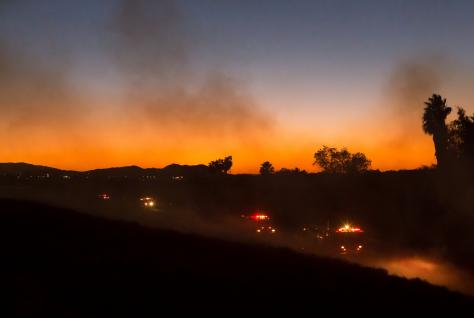Air Quality, Fires, and Your Health
Published: 08/27/2021
City of Riverside Fire Department: RiversideCA.gov/fire
ReadyRiverside Air Quality Information: CLICK HERE
Air Quality, Fires, and Your Health
From AirNow.com
Smoke is made up of a complex mixture of gases and fine particles produced when wood and other organic materials burn. The biggest health threat from smoke is from fine particles. These microscopic particles can get into your eyes and respiratory system, where they can cause health problems such as burning eyes, runny nose, and illnesses such as bronchitis. Fine particles also can aggravate chronic heart and lung diseases - and even are linked to premature deaths in people with these conditions.
If you are healthy, you're usually not at a major risk from short-term exposures to smoke. Still, it's a good idea to avoid breathing smoke if you can help it. Everyone should take the steps below when wildfires are present.
Use common sense. If it looks smoky outside, it's probably not a good time to mow the lawn or go for a run. And it's probably not a good time for your children to play outdoors.
Pay attention to local air quality reports. Stay alert to smoke-related news coverage or health warnings.
Visit AirNow to find out the Air Quality Index in your area. As smoke gets worse, the amount of particles in the air changes - and so do the steps you should take to protect yourself. AirNow recommends precautions you can take to protect your health when air pollution gets bad.
If you are advised to stay indoors, take steps to keep indoor air as clean as possible. When smoke levels are high, try to avoid using anything that burns, such as wood fireplaces, gas logs, gas stoves - and even candles! Don't vacuum. That stirs up particles already inside your home. And don't smoke. That puts even more pollution in your lungs, and in the lungs of people around you.
If you have asthma or other lung disease, make sure you follow your doctor's directions about taking your medicines and following your asthma management plan. Call your doctor if your symptoms worsen.
Run your air conditioner if you have one. Keep the fresh air intake closed and the filter clean to prevent bringing additional smoke inside. Note: If you don't have an air conditioner, staying inside with the windows closed may be dangerous in extremely hot weather. In these cases, seek alternative shelter.
If you have heart or lung disease, if you are an older adult, or if you have children, talk with your doctor about whether and when you should leave the area. When smoke is heavy for a prolonged period of time, fine particles can build up indoors, even though you may not be able to see them.
To track wildfires across the U.S., go to Fire and Smoke Map.


